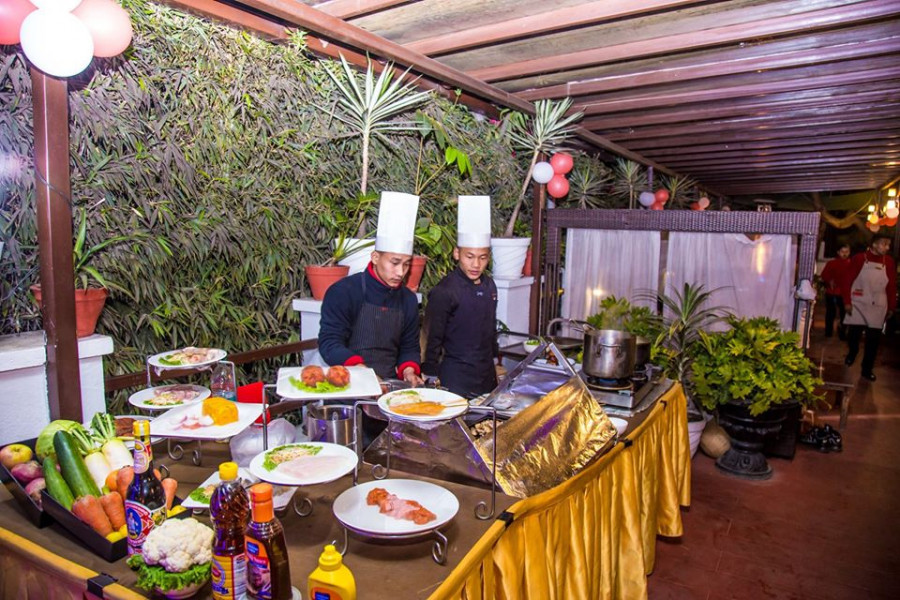Money
Party venues dismayed by latest Covid-19 restrictions
Instead of placing restrictions, the government should conduct strict inspections and close border points with India, entrepreneurs say.
Krishana Prasain
Party palaces and caterers are dismayed by the latest government regulation that has severely restricted their business as the country moves to contain the second wave of the coronavirus by preventing close contact between people.
The cabinet decreed Monday that public establishments like banquet halls, cinemas, dance bars, health clubs, gyms, swimming pools, futsal courts and stadiums will remain closed until May 14.
But the government has thrown banquet halls a lifeline by allowing them to hold parties for a maximum of 25 guests after getting a permit from the chief district officer.
Restaurants and party palaces bore the brunt of the lockdown last year. The eateries were forced to close overnight, and thousands of waiters, cooks and other employees were out of work with no respite in sight.
The end of the stay-home order allowed the economy to stir back to life, and just when the restaurant industry was seeing a semblance of a recovery, they were told to close early.
The latest decree is a letdown, entrepreneurs said, particularly because it has come at the height of the wedding season, and party palaces were looking forward to a bonanza due to pent-up demand as all events were postponed.
“We had better-than-expected bookings,” said Krishna Prasad Pandey, spokesperson for the National Party Palace and Catering Federation. “Though there have been no cancellations as of Wednesday, customers have started trimming their guest list,” he said.
Pandey said that the federation had decided to request the government to cancel the rule requiring them to get approval from the chief district officer to host weddings and other events.
“We have also asked our member establishments to provide services by following all health and safety protocols as directed by the government,” he said.
“Instead of placing restrictions on businesses, it would be better if the government conducted strict inspections and closed the national borders and entry points to control the spread of the virus,” he said.
“If the current state of uncertainty prolongs, around 75 percent of party palace owners will go bankrupt.”
Party palaces and banquet halls have been paying around Rs3 billion in taxes annually to the government,” he said. “It’s also a loss for the government if they close down.”
For many party palace operators, the business they get during the peak season, which lasts from mid-April to mid-June, sustains them for the next five months. All bookings for weddings were cancelled last year following the lockdown in March.
Domestic carrier Buddha Air said there were increased flight bookings for April and May as pending weddings and events across the country were being scheduled for these months.
Last March, domestic airlines saw an all-time monthly high in passenger carriage. As per the figures released by the Civil Aviation Authority of Nepal, 346,471 passengers took to the air last month which is an unprecedented number.
Even in March last year, when the aviation sector suffered its worst days with the government declaring a complete lockdown from March 24, there were 213,770 domestic passengers.
The restriction on party palaces, according to the federation, will impact the jobs of hundreds of workers.
According to the federation, there are 7,000 party palaces associated with the federation which translates into 60,000 jobs.
More than 70 percent of these establishments are operating with bank loans, officials said.
According to party palace operators, they have been operating at 40 percent of capacity since November 2020. Many of them have gone bankrupt.
Restaurant owners also have similar tales of woe. The government has permitted restaurants to open for 12 hours from 8 am to 8 pm by adhering to health protocols. They are allowed to provide take away or home delivery service after business hours.
“This is a partial restriction. But why are there restrictions for restaurants only? What about the restaurants being operated in hotels and other public places?” said Araniko Rajbandari, president of the Restaurant and Bar Association Nepal.
There has been no inspection from the government side whether people are following the safety protocols or not as cutting operating hours only will not control the spread of the virus, he said.
According to Rajbhandari, restaurant revenues have dropped by 25-30 percent in the past three weeks since the second wave spread started spiking. “People seem to have become psychologically disinclined to dine out, especially in recent days with the daily rise in the number of Covid-19 cases,” he said.
There has been no significant growth in take away or even in delivery of food since the government imposed the restrictions, he said.
“As per our experience last year, providing take away and home delivery service by the restaurant itself is costly as we have to bear additional expenses, and the extra charges also make it more expensive for customers compared to dining in a restaurant."




 14.24°C Kathmandu
14.24°C Kathmandu















